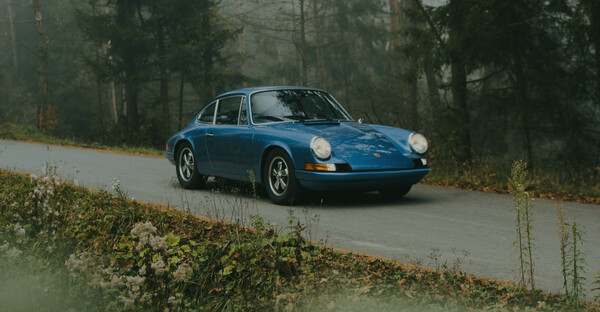Description
One of only 84 DB MkIII drophead coupés
Sold new to KN Rudd Ltd of Ruddspeed fame
Original registration number and matching-numbers engine
Right-hand-drive, UK-market car
VEHICLE DESCRIPTION
Production of the Aston Martin DB MkIII totalled 551 cars, but the vast majority of those were the saloon model. Only 84 featured the stylish drophead coupé bodywork, making this particular car a very rare survivor.
Chassis number ‘1687’ was a right-hand-drive, UK-market car that was first registered on 2 May 1959. It was sold as a demonstrator to KN Rudd (Engineers) Ltd of Worthing in West Sussex. Ken Rudd was a very capable racing driver who became better known thanks to the Ruddspeed tuning conversions he developed for various cars during the 1950s and 1960s.
The DB MkIII was supplied in Elusive Blue with a Blue-Grey interior, and was specified with the optional overdrive unit for the four-speed gearbox. It featured the standard twin-carburettor DBA engine, and subsequent owners listed on the factory data sheet include ABB Clark – a Commander in the Royal Navy who was based in Lossiemouth – then HF Benson of Staines, DWT Hague of Oldham, and finally Dr Greenal, who lived in London and used the Aston Martin in a sprint at Curborough in 1968.
Having spent time with an owner in Belgium, the DB MkIII was offered for sale in 2017 by a dealer in The Netherlands. At that stage, a report by noted Aston Martin expert Stephen Archer was commissioned by its next owner, and Archer reported that the car had obviously been well restored. He wrote that the chassis was ‘powder-coated and still looks fresh’, and surmised that the ‘rebuild was not only a body-off project but a total chassis strip as well’.
The car was subsequently imported to the UK and reunited with its original registration number: 1602 PO. It has retained its original engine (DBA 1332), and when it arrived from The Netherlands it benefitted from work that included a new brake master cylinder, engine mounts, kingpin assemblies, rear dampers, propshaft and brake servo.
The chassis box sections were treated with cavity wax, an electric cooling fan was fitted, and the attention to detail even extended to sourcing the correct jack and tool kit. Since then, this DB MkIII has been regularly serviced and maintained by an Aston Martin main dealer. Widely considered to the best-looking model in the famous DB2 series, it is now being offered for sale as a supremely elegant and distinguished choice of 1950s grand tourer.
MODEL HISTORY
The Aston Martin DB MkIII was the ultimate development of the DB2 series, which had been introduced in 1950. For this final incarnation, which was introduced in 1957, the front end was revised so that it was lower and sleeker, evoking the company’s beautiful DB3S sports-racing car.
Beneath the bonnet was the 2922cc straight-six engine that had been carried over from the previous DB2/ 4 MkII, albeit now with a stronger crankcase and a modified cylinder head.
Standard fitment was the DBA engine, running on twin SU carburettors and producing 162bhp. Then there was the more powerful DBD, which gave 180bhp on triple carburettors and twin exhausts, and finally the rare, high-compression DBB unit, which was said to produce 195bhp on triple Weber carburettors.
An overdrive unit was offered as an option for the four-speed gearbox, and the clutch featured hydraulic actuation rather than mechanical. Front disc brakes were standard and the interior was completely redesigned, with all the gauges and instruments arranged in a single binnacle directly in front of the driver.
When American magazine Sports Cars Illustrated tested a DB MkIII in late 1957, it said that it ‘offers a truly sporting drive with pur sang handling characteristics better than most of the popular sports cars.’
The DB MkIII was offered as a saloon or drophead coupé – plus a very rare fixed-head coupé. In late 1957, the saloon cost £3076 including purchase tax, considerably more than a comparable Jaguar XK 150, but the Aston Martin was produced in much smaller numbers before it was discontinued in 1959 following the introduction of the all-new DB4.



















